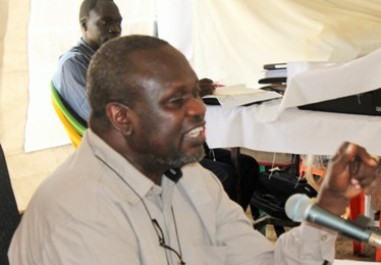SPLM-IO not abandoning Equatoria and Bahr el Ghazal regions: Spokesperson
May 19, 2016 (JUBA) – The armed opposition faction, the SPLM-IO, under the leadership of the First Vice-President, Riek Machar, dismissed speculations that they would abandon demands on cantonment areas for their forces in Equatoria and Bahr el Ghazal regions.

“This is about implementing the security arrangements in order to restore stability in the whole country,” he said.
He was responding to speculations on the social media that the transitional government of national unity might not resolve the issue and that the SPLM-IO might have to abandon their claim for cantonment areas in the two regions.
But Dak said the issue over cantonment of the forces in the two regions is expected to be discussed on Friday, 20 May, by the council of ministers of the unity to resolve it.
He also added that other pending issues such as the status of the controversial 28 states and reconstitution of the national parliament are expected to be tackled in the subsequent cabinet meetings.
“SPLM (IO) leadership is committed to the full implementation of the peace agreement, and of course, including the cantonment of our forces in Bahr el Ghazal and Equatoria regions per the security arrangements,” he said.
Also tackling the number of states in the country, he added, is a priority so that the parties agree on criteria and the number of new states to be created, or revert to the 10 states on which the peace agreement was signed in case of disagreement.
He said the leadership of the SPLM-IO wanted the contentious issues addressed in order to move the country forward in the implementation of the peace deal.
The new cabinet of the unity government has delayed to discuss the issues since formation three weeks ago.
According to a communiqué of 31 January 2016 issued by the East African regional bloc, the Intergovernmental Authority on Development (IGAD), the parties should have formed an inclusive boundary commission from the time the unity government was formed so as to tackle the matter within 30 days.
IGAD also provided a roadmap for the resolution of the creation of new states, saying the parties should revert to the 10 states if they could not agree on the number of boundaries of new states.
The Joint Monitoring and Evaluation Commission (JMEC), which oversees the implementation of the August 2015 peace agreement, and the United Nations Security Council (UNSC) also adopted the position taken by IGAD.
State governments for the new government have not yet been formed due to lack of agreement on the number of states, including how many states should be represented in the parliamentary council of states.
It is yet to be seen if the new council of ministers will discuss and resolve the contentious issues.
(ST)
